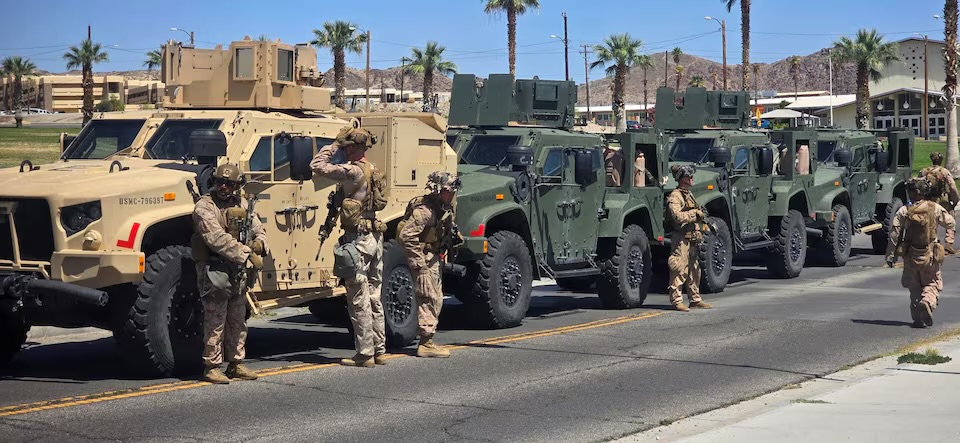Hundreds of U.S. Marines have arrived in Los Angeles under orders from President Donald Trump, escalating a federal response to recent protests sparked by sweeping immigration raids.
Despite largely peaceful demonstrations on Monday, Trump authorized the deployment of roughly 700 Marines and activated 4,000 National Guard troops, drawing sharp criticism from California Governor Gavin Newsom and other local leaders.
According to a U.S. official, around half of the Marines arrived late Monday, with the rest expected on Tuesday.
The Department of Defense has yet to comment publicly. U.S. Northern Command said the Marines, alongside National Guard forces, will help protect federal buildings and personnel. By Monday, approximately 1,700 Guard troops were already stationed in the greater Los Angeles area.
Recall that the protests began on Friday following a series of immigration raids by federal authorities. While early demonstrations included isolated incidents of looting, vandalism, and clashes with police, officials said Monday’s protests were more restrained.
Meanwhile,more than 100 people were arrested, but Los Angeles Mayor Karen Bass emphasized that the majority of demonstrators were peaceful.
Trump has defended the military deployment, characterizing the protests as a violent uprising. In a social media post on Tuesday morning, he claimed that without military intervention, Los Angeles would be “burning to the ground.”
However, local and state officials have accused him of exaggerating the threat to justify an unnecessary show of force.
Governor Newsom called the move an illegal escalation, filing a lawsuit Monday challenging the deployment of Guard troops without his consent, the first such activation in decades without a governor’s request.
Newsom argued that the president’s decision has complicated law enforcement efforts on the ground. “This isn’t about public safety,” he said on social media. “It’s about stroking a dangerous President’s ego.”
Los Angeles Police, Chief Jim McDonnell echoed concerns, saying the Marines’ unexpected arrival posed logistical challenges for local authorities.
The top Democrat on the Senate Armed Services Committee, Senator Jack Reed expressed alarm over the use of active-duty military on U.S. soil. “Since our nation’s founding, the American people have been perfectly clear: we do not want the military conducting law enforcement,” he said.
The Marine deployment comes amid heightened tensions surrounding Trump’s immigration crackdown. Homeland Security Secretary Kristi Noem vowed Monday to intensify operations targeting undocumented immigrants. Protesters and immigration advocates accuse the administration of tearing families apart and criminalizing immigrant communities, especially in sanctuary cities like Los Angeles.
On Monday, hundreds of demonstrators gathered outside a federal detention center in downtown Los Angeles, waving Central American flags and chanting “free them all.” National Guard troops formed a barrier to block entry to the building. Later in the evening, police dispersed the crowd using gas canisters and made arrests.
The protests continued into the night, with clashes erupting in the city’s Little Tokyo district. Officers deployed flash-bang grenades and tear gas to scatter protesters, as bystanders watched from apartment balconies and hotel lobbies.
Similar protests erupted in Orange County, particularly at the Santa Ana Federal Building, and in at least nine other cities, including New York, San Francisco, and Philadelphia.
In Austin, Texas, police fired non-lethal munitions and detained several protesters after confrontations near the state capitol.
While the Marines are primarily trained for overseas conflicts, some units have riot-control experience and are being used here in a rare domestic role. Their deployment marks a significant escalation in the federal government’s response to protests and has deepened the political divide over Trump’s immigration and law enforcement policies.
Read also: Trump sends national guard to Los Angeles following immigration raid protests



